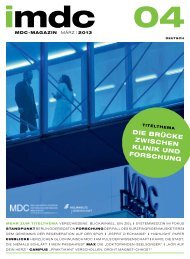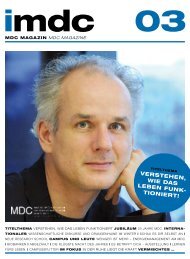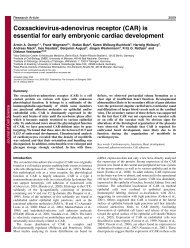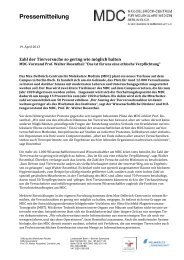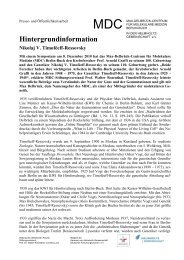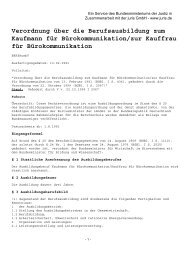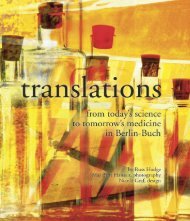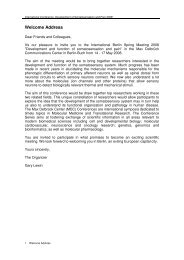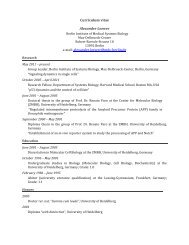of the Max - MDC
of the Max - MDC
of the Max - MDC
You also want an ePaper? Increase the reach of your titles
YUMPU automatically turns print PDFs into web optimized ePapers that Google loves.
Structural and Functional Genomics<br />
Coordinator: Udo Heinemann<br />
Macromolecular Structure<br />
and Interaction<br />
Udo Heinemann<br />
The inner workings <strong>of</strong> <strong>the</strong> cells forming healthy or diseased organisms are governed by <strong>the</strong> interplay<br />
<strong>of</strong> thousands <strong>of</strong> large and small molecules. The activities <strong>of</strong> <strong>the</strong>se molecules – proteins,<br />
nucleic acids, carbohydrates, lipids, membranes and small metabolites – are tightly regulated in time<br />
and space. They can be described according to <strong>the</strong> concept <strong>of</strong> functional modules: defined units <strong>of</strong><br />
cellular activity that assemble into discrete, stable entities during function and <strong>of</strong>ten undergo cyclic<br />
structural rearrangements. A functional module is characterized by its supra-molecular architecture<br />
and <strong>the</strong> time domain within which it functions. It receives a specific input and delivers an appropriate<br />
output to <strong>the</strong> cell. Some functional modules are best described as molecular machines, whereas<br />
o<strong>the</strong>rs are characterized by a dynamic assembly and disassembly <strong>of</strong> <strong>the</strong>ir constituent parts. Our laboratory<br />
focuses on structural analyses <strong>of</strong> functional modules using macromolecular crystallography as<br />
its central method. This approach implies that we primarily address <strong>the</strong> lower levels <strong>of</strong> modular<br />
organization which carry out molecular and sub-modular functions. Structural data must be combined<br />
with time-resolved functional analyses and <strong>the</strong>ory to yield proper insight into modular function.<br />
Structural proteomics<br />
Ulf Lenski, Yvette Roske, Jörg Schulze, Anja Schütz<br />
Within a Berlin-area structural proteomics project, more<br />
than 500 human genes were cloned into more than 1400<br />
Escherichia coli expression vectors, and more than 100 proteins<br />
were purified for biophysical and structural studies.<br />
This public catalogue <strong>of</strong> expression clones constitutes an<br />
important resource for our structural studies. In collaboration<br />
with <strong>the</strong> laboratory <strong>of</strong> K. Büssow (Helmholtz-Zentrum<br />
für Infektionsforschung, HZI, Braunschweig) <strong>the</strong> methodology<br />
used in generating this resource has been extended to<br />
<strong>the</strong> expression cloning and purification <strong>of</strong> protein complexes<br />
containing, in principle, an unlimited number <strong>of</strong> different<br />
subunits. These complexes may have properties <strong>of</strong> functional<br />
modules or sub-modules.<br />
The available methods for <strong>the</strong> production <strong>of</strong> single recombinant<br />
proteins or protein complexes provide <strong>the</strong> basis for <strong>the</strong><br />
recently established Helmholtz Protein Sample Production<br />
Facility (Helmholtz PSPF). In a collaborative effort <strong>of</strong> <strong>MDC</strong><br />
and HZI, <strong>the</strong> Helmholtz PSPF (www.pspf.de) develops and<br />
applies methods for protein sample production in various<br />
hosts and at elevated throughput which are available to<br />
interested researchers from Helmholtz centers and o<strong>the</strong>r<br />
basic science institutions.<br />
Intracellular signaling and cell proliferation<br />
control<br />
Sarbani Bhattacharya, Kerstin Böhm, Jürgen J. Müller,<br />
Jörg Schulze<br />
The growth arrest and DNA damage responsive protein<br />
GADD45γ is a member <strong>of</strong> a small group <strong>of</strong> human proteins<br />
that play an important role in cell growth and proliferation<br />
regulation with specific functions in cell cycle control, MAPK<br />
signalling, apoptosis and immune responses. As <strong>the</strong> related<br />
Cancer Research 109



